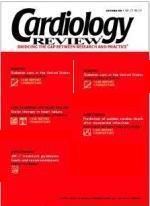Publication
Article
Cardiology Review® Online
Risk factors for HF identified in older women with coronary disease
Diabetes triples the risk of developing heart failure (HF) in postmenopausal women with heart disease, and kidney disease or poorly controlled diabetes confers a 6 to 10 times increased risk of HF compared with women without diabetes. These findings were gleaned from a new analysis of the Heart and Estrogen/progestin Replacement Study (HERS), which appears in Circulation (2004;110[11]:1424-1430).
“We have identified several risk factors that could be modified and have the potential to reduce the burden of heart failure in women with established coronary disease,” write the study’s authors, led by Kirsten Bibbins-Domingo, PhD, MD, instructor in medicine, epidemiology, and biostatistics, University of California, San Francisco.
The analysis included 2,391 postmenopausal women with known coronary disease but no HF at baseline. The mean follow-up time was 6.3 years, during which time 237 women were hospitalized or died of HF. After adjusting for age and medication use, nine factors were independently associated with the development of HF.
The strongest risk factor for development of HF was diabetes at study entry, which conferred a 3.1 times greater risk, followed by atrial fibrillation, which was associated with a hazard ratio of 2.9. The other significant risk factors were more than one previous myocardial infarction, renal insufficiency (defined as a creatinine clearance < 40 mL/
min), systolic blood pressure greater than 140 mm Hg, current smoking, body mass index (BMI) greater than 35 kg/m2, left bundle branch block, and left ventricular hypertrophy.
Uncontrolled hypertension was present in about one third of the women in the study. Even systolic blood pressures in the range of 120 to 140 mm Hg were associated with a significantly increased risk of HF. The authors emphasize that blood pressure control “should be an integral part of heart failure prevention,” noting that antihypertensive therapy has been shown in clinical trials to reduce HF risk.
“We found higher fasting blood glucose levels to predict a greater adjusted risk of heart failure among diabetic women with coronary disease,” state the authors. Compared with diabetic women with controlled fasting blood sugar (80 to 150 mg/dL), those with fasting blood glucose higher than 300 mg/dL had a threefold adjusted risk of incident HF. Clinical trials are needed to determine whether or not treatment of long-standing hyperglycemia will decrease the risk of developing HF, the authors add.
The risk of developing HF increased steadily with the number of risk factors, such that women with no risk factors had an annual incidence of 0.4%, whereas women with three or more risk factors but no diabetes had a 3.4% annual incidence of HF. Diabetic women with three or more additional risk factors had a yearly HF incidence of 8.2%.
Among the diabetic women, concomitant renal insufficiency was associated with the highest annual incidence of HF (12.8%). Diabetic women with morbid obesity (BMI > 36 kg/m2) had an annual incidence of 7.0%.
Halting the progression of renal disease through the use of angiotensin-converting enzyme inhibitors and angiotensin receptor blockers may be important for modifying HF risk in women with diabetes and coronary disease, the authors state.
According to Dr. Bibbins-Domingo, the take-home message for physicians is the need to recognize that
(1) diabetes is a powerful risk factor for HF in women, independent of whether or not they have had a heart attack; (2) diabetic women can have an annual risk of HF as high as 7% to 13% per year if they also have obesity, renal insufficiency, or if their diabetes is poorly controlled; and (3)
the focus should be on prevention, including glycemic control, control of blood pressure, weight control, and smoking cessation.
